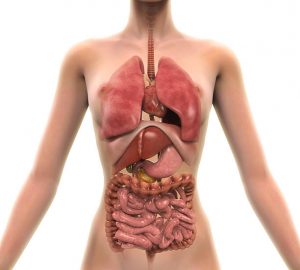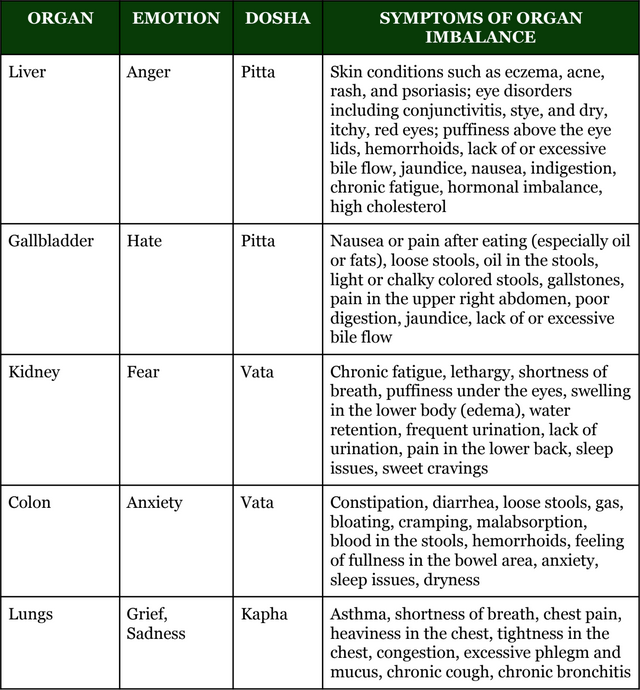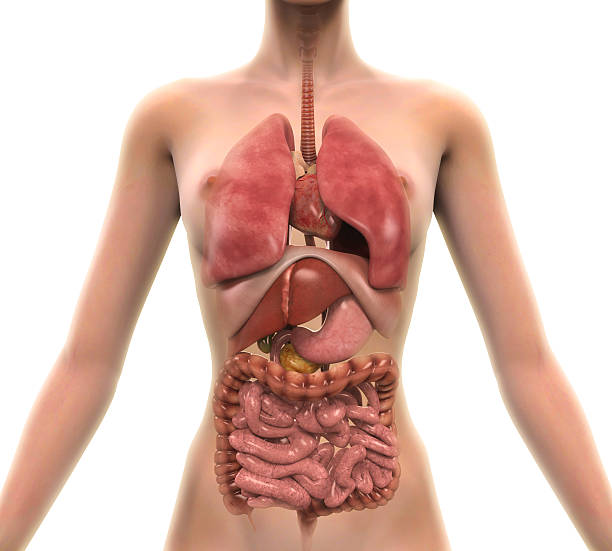
It is clearly stated in Ayurveda that there is a powerful mind, body, and spirit connection. In order to establish health in any of these areas, we must obtain health in all three. Our emotions have a direct effect on our physical body (and vice versa) and if we have deep-seated, unresolved emotions, our physical health will never be at its best. Although our emotions may have numerous negative effects on our body, each emotion has an affinity with a specific organ. Any long-term, deep-seated emotional imbalance will begin to weaken the affected area, and over time can cause health conditions related to the organ.
When we hold onto and hide our emotions, they become unprocessed, crystalized, and toxic to our system. By knowing where our emotional imbalances lie and the vital organ that is being affected, we can then begin to piece together a treatment plan that will help us to process our emotions and release them from their storage space. Since our emotional tendencies are often lifelong, recurring habits, the related organ will likely be weak and congested due to the long-term imbalance. Therefore, we will need to cleanse, strengthen, and restore the health of that organ while we work on our emotional healing. In this sense, we can put together a well-rounded regimen that will aim to heal both our minds and body.
As you will see in the chart below, our organs and their respective emotion will also be correlated with a specific doshic imbalance that is related to both the organ and the emotion. This is important to understand since we can balance our emotions and heal our organs by pacifying the appropriate dosha that is involved. Alternatively, if we aggravate the dosha, we will subsequently provoke an emotional imbalance and further disturb the health of our organs. For example, a Pitta-provoking diet filled with hot spicy foods, red meat, and refined sugar will trigger more anger and further weaken the liver. If a liver condition has already manifested, then this condition will become aggravated as well.

So now that you have an idea of which emotion will affect which organ, let us go a bit deeper and examine these areas to discover how to create emotional and physical health.
The Relationship Between Our Organs And Our Emotions
Anger and the Liver
Not surprisingly the liver is said to be directly affected by excessive, chronic, and deep-rooted anger issues. The liver is governed by the Pitta “sub-dosha” known as Ranjaka Pitta, and anger is a Pitta emotion related to Sadhaka Pitta in the mind. With this general link between the Pitta subtypes, the anger is directly correlated with the balance of Pitta dosha, and any unprocessed anger will increase both the Pitta in the mind and create heat, inflammation, and depletion in the liver.
If your go-to emotion has been anger throughout your life, you likely have some residual, unprocessed anger stored in the liver creating weakness in this organ and related healthcare issues. To establish health, you can begin to work through the anger through regular meditation, Yoga, spending time in nature, deep breathing practices, therapy, and journaling. The most important thing will be to spend time with your anger, feel your anger, breathe through your anger, and (eventually) release this emotion from your being. Thank your anger for stopping by, but acknowledge that it is no longer needed.
While processing through your anger, making some appropriate diet and lifestyle changes will help to reduce your overall Pitta, cleanse your system, improve your digestion, and strengthen your liver. Here are a few places to begin:
- Follow a Pitta-reducing diet (click here for more details)
- Avoid direct sun, excessive exercise (especially mid-day), overworking, and stressful situations
- Avoid arguing and conflict
- Spend time in good company
- Perform a liver cleanse (if appropriate) or an ongoing weekly kitchari fast
- Massage the abdomen and liver area with a castor oil and coconut oil blend each night
- Massage the scalp, temples, and feet with coconut oil before bed each night
- Go to bed by 10 pm and awaken by 5 to 6 am
While following these guidelines, it is further recommended to take advantage of some herbal medicine to aid in healing both the liver and the mind. Here are a few suggestions for deep-seated anger and liver issues:
- Tikta Ghrita (bitter ghee)
- Love Your Liver Tincture
- Majja Ghrita
- Prana Nasya
- OM Shanti Tea
- COOL DOWN Tea
Hate and the Gallbladder
Similar to anger, hate is considered a heating, Pitta-type emotion and is said to have a direct effect on the gallbladder. Like the liver, the gallbladder is considered a Pitta organ, and therefore pacifying Pitta will reduce feelings of hatred as well as heal the gallbladder. Alternatively, any food or activity that is said to increase Pitta may likely provoke both feelings of hatred, and worsen any gallbladder issue that has manifested.
Hate is a very strong emotion and can be very detrimental to your health. If you have had ongoing issues with this emotion throughout your life, it is extremely important to acknowledge this habit and allow yourself to process through any residual hatred. It will be helpful (if not essential) to find tools that will help process through and prevent this feeling from arising as you move forward.
In order to work through your hate, practicing meditation, calming Yoga, and deep belly breathing are all great tools. Spending some peaceful time in nature, journaling, and talking to a professional therapist can also be of great value. The most important thing will be to spend time with your hate, allow yourself to really feel it, and (eventually) release this emotion from your being. Without processing through our old, stuck hatred, true healing will not be possible.
Since anger and hatred often go hand and hand, the recommendations for pacifying anger are similar for hatred as well. The following recommendations will reduce your overall Pitta, cleanse your system, improve your digestion, and strengthen your gallbladder.
- Follow a Pitta-reducing diet (click here for more details)
- Avoid direct sun, excessive exercise (especially mid-day), overworking, and stressful situations
- Avoid arguing and conflict
- Spend time in good company
- Perform a liver cleanse (if appropriate), kitchari cleanse, or an ongoing weekly kitchari fast
- Massage the abdomen and gallbladder area with a castor oil and coconut oil blend each night
- Massage the scalp, temples, and feet with coconut oil before bed each night
- Go to bed by 10 pm and awaken by 5 to 6 am
While following these guidelines, it is further recommended to utilize some herbal medicine to aid in healing both the gallbladder and the mind. Here are a few suggestions for deep-seated hate and gallbladder issues:
- Love Your Liver Tincture
- Mahasudarshana Churna
- Prana Nasya
- OM Shanti Tea
- COOL DOWN Tea
Fear and the Kidneys
Although the kidneys are mainly a Kapha organ, they are intimately linked to Vata as well. Fear is a common Vata emotion and since the kidneys and the adrenals are functionally related, constant fear can spark the “fight or flight response”, keeping our adrenaline pumping when it is not needed and making us overstimulated, hyperactive, and hypersensitive (and eventually burnt-out). Naturally continuous spouts of fear will in time deplete our adrenals, weaken our kidneys, drain our energy, and create imbalances throughout our system.
Fear is a very powerful emotion that can get the best of us at times. Like anxiety, fear can be very pervasive and seemingly take over our mind and nervous system. If you have been dealing with recurring fear throughout your life, it is essential for your mental and physical health that you begin to take charge. Similar to stress, chronic fear is often very deep-rooted and will deplete your system and create healthcare issues in a very subtle and “silent” way.
As with any imbalance, the first step will be to acknowledge your fear and begin to really take notice as soon as it begins to manifest. Once you begin to see your patterns for what they are, you can then notice your triggers and create a well-rounded regimen to treat the fear as it comes and eventually prevent it from spiking altogether.
As with any emotion, in order to heal from any unprocessed fear, we must take the time to sit with it, feel it, digest it, and send it on its way. Some essential tools for dealing with your fear are meditation, restorative Yoga, deep belly breathing, Nadi Shodhana (alternate nostril breathing), ujjayi breathing, brahmari breath work, nature walks, peaceful walks, gentle exercise, and talking to a therapist.
While you are working to process through and heal from your fear, following a Vata-soothing diet and lifestyle will be of great importance. Here are some suggestions to follow during your healing period:
- Follow a Vata-reducing diet (click here for more details)
- Eliminate all caffeine from the diet including from tea
- Avoid excessive activity and over-stimulating situations
- Avoid travel (at least until the fear is under control)
- Keep a very simple and consistent daily routine
- Do not skip meals
- Avoid intense exercise, especially that involves jumping, jogging, and bouncing
- Perform a gentle Vata-specific kitchari cleanse, or an ongoing weekly kitchari fast
- Perform Dashamula Basti weekly
- Massage the lower back with sesame oil each night before bed (make sure to get the kidney area)
- Massage the scalp, forehead, neck, and feet with sesame oil before bed
- Go to bed by 10 pm and awaken by 6 to 7 am
While following these guidelines, it is further recommended to take some herbal medicine that will aid in healing the kidneys, adrenals, and the mind. Here are a few suggestions for deep-seated fear and kidney issues:
- Saraswati Churna
- Majja Ghrita
- Dashamula Basti (herbal enema)
- Prana Nasya
- CALM Tea
- OM Shanti Tea
- Sleep Easy Tincture
- Sleep Easy Syrup
Anxiety and the Colon
Anxiety is a very common Vata-type emotion and long-term or severe anxiety will have a direct effect on the colon – the main “home” of Vata dosha. The colon facilitates the final part of the digestive process by absorbing any leftover water, minerals, and electrolytes; fermenting any indigestible food matter; storing the waste; and (ideally) expelling it from our system. By holding onto our anxiety in the colon, these natural processes can be hindered causing improper hydration, malabsorption, constipation, gas, bloating, loose stools, diarrhea, and eventually leading to a full-blown bowel disorder (i.e. IBS, Crohn’s, gastritis, etc).
Similar to fear, anxiety is a very powerful emotion that can often make you feel out of control, scattered, shaky, hypersensitive, and restless. Like Vata, it is a “subtle” emotion that can penetrate and permeate your entire mind and nervous system before being stored in the colon. Anxiety can often spike in the evening and create insomnia or other sleep disorders. Therefore, for the health of your colon, your body, and your mind, it is extremely important to deal with the anxiety head-on and take charge of your life again.
The first step for treating anxiety will be to use total awareness to see your emotional patterns, triggers, and simply how and when the anxiety comes up throughout your day. Once you see these patterns, you can then begin to realize immediately when it comes on (and ideally just before) and feel it without letting it take over. Often anxiety is such a subtle emotion, we can be experiencing it all day long without noticing it as if it is just a part of who we are. Quite contrary, however, we are not our anxiety, but a simple bystander that can watch this anxiety like a movie. By realizing that we are separate and ultimately in control of our anxiety (and mind as a whole), we can then begin a path toward healing.
As you take the time to process and digest your deep-rooted anxiety, it is highly recommended to use some essential tools to aid in this not-so-easy journey. Meditation, restorative Yoga, deep belly breathing, Nadi Shodhana (alternate nostril breathing), ujjayi breathing, brahmari breath work, nature walks, peaceful walks in the fresh air, gentle exercise, journaling, and talking to a therapist can all be of great value. Being a Vata-type emotion, following a Vata-soothing diet and lifestyle will be of great importance as well. Here are some suggestions to follow during your healing period:
- Follow a Vata-reducing diet (click here for more details)
- Eliminate all caffeine from the diet including from tea
- Avoid excessive activity, excessive social interaction, excessive talking, and over-stimulating situations
- Avoid travel (at least until the anxiety is under control)
- Keep a very simple and consistent daily routine
- Do not skip meals
- Avoid intense exercise, especially that involves jumping, jogging, and bouncing
- Perform a gentle Vata-specific kitchari cleanse, or an ongoing weekly kitchari fast
- Perform Dashamula Basti weekly
- Massage the abdomen in a clockwork motion with sesame oil each night before bed
- Massage the scalp, forehead, and feet with sesame oil before bed
- Go to bed by 10 pm and awaken by 6 to 7 am
While following these guidelines, it is further recommended to include some herbal medicine in your treatment plan for healing the Vata, the colon, and the mind. Here are a few suggestions for deep-seated anxiety and colon issues:
- Majja Ghrita
- Saraswati Churna
- Dashamula Basti (herbal enema)
- Prana Nasya
- CALM Tea
- OM Shanti Tea
- Sleep Easy Tincture
- Nidra Nasya
Grief and the Lungs
The lungs are quite fittingly one of the major Kapha organs, just as grief is one of the main Kapha-type emotions. The lungs are responsible for our oxygen intake and gas exchange that makes up our respiration. Being the seat of sadness and grief, it is common knowledge that when we are dealing with these emotions firsthand, we often feel a sense of heaviness and constriction in the chest. The chest is also our heart center and therefore these emotions can equally cause feelings of a heavy, hurt, or “broken” heart.
Long-term grief, sadness, and depression will be held in the lungs and over time can create distress and disorder. Some signs that you may be holding onto your grief and sadness may be shortness of breath, labored breathing, chronic cough and congestion, chronic bronchitis, walking pneumonia, COPD, and emphysema. Emotionally you may feel a lack of vigor, mental fog, mental and physical fatigue, general feeling of heaviness, laziness, and lack of motivation.
If you suspect that you are experiencing deep-seated grief, it is essential to process through and release any sadness that has been stored over time. In order to digest our emotions properly, we must allow ourselves to feel our sadness, without dwelling on it or becoming overtaken by it. Take the time to look at your sadness directly, notice where it is coming from, acknowledge it, feel it, and let it be free.
Just as with the other emotions, some of the best tools we can use to work through and release our grief is mediation, Yoga, and pranayama. Since grief is related to Kapha and the lungs, performing a Kapha-reducing Yoga routine filled with chest openers and backbends will be very effective (get some ideas here!). The sun salutation (Surya Namaskara) is equally as beneficial and can be a great way to welcome each day with vigor. The best breathing practices for treating grief and depression will be Kapalabhati, Nadi Shodha, or simply deep belly breathing. If you are not into any of these practices, other helpful activities to process grief include moderate cardio exercise, brisk walks in the fresh air, talk therapy, and nature hikes.
With grief being a heavy, Kapha-induced emotion, it will be very beneficial to follow a Kapha-reducing diet and lifestyle during your healing process. Here are some guidelines to keep in mind:
- Follow a Kapha-reducing diet (click here for more details)
- Avoid snacking, grazing, and eating past 6 to 7 pm
- Take a walk after meals
- Avoid excessive sleeping at night (5 to 7 hours nightly is best)
- Wake up before 6 am daily
- Avoid daytime sleeping
- Get at least 30 minutes of moderate exercise daily
- Show yourself some love with daily self-care practices (baths, oil massage, hobby time, dance classes, Yoga, etc)
While following these guidelines, it will be helpful to add in some herbal medicine to expedite the healing process and nourish the lungs, reduce the Kapha, and resolve the grief. Here are a few suggestions:
- Trikatu Churna
- AWAKEN Tea
- Tulsi Synergy Spice Tea
- OM Shanti Tea
- Respiratory Relief Syrup
- Agni Elixir
- Ginger Bath Blend
- Prana Nasya
- Soothing Sinus Nasya
Conclusion
Our emotions have a direct effect on our physical health that may result in imbalance and eventually disease. It is important to be aware of our emotions and the organs which they affect in order to obtain optimal health and well-being. The mind-body-spirit connection is inseparable and to establish wellness in one area, we must find balance in all three. By acknowledging and processing through our emotions we can begin to see them for what they are, separate ourselves from them, feel them, digest them, and send them on their way.
Emotions are not a negative thing. They are a healthy part of our being; it is only when we ignore them, store them, hold on to them, or repress them that they begin to create ill-health and disharmony. Please always remember, we are in control of our minds, our emotions, and our health! OM Shanti!



Phenomenal article, Danielle. You always do such a great job of tying all of the pieces together in your posts. Keep up the good work! Namaste.
Hi Karen,
Thank you for your kind words. It means a lot to hear them from another practitioner. Thank you for writing in and thank you for reading:) Many blessings!
Namaste,
Danielle
You have really done a good job on this. I am a herbal practitioner and I believe all you wrote here. Thank you so much. Can I have your permission to teach from this write up?
Hi Toyin,
Thank you for writing in! I am happy you enjoyed and appreciate the article. Feel free to pass this information along to your students as you wish. Thanks for sharing!
Take it slow and BE well:)
Namaste,
Danielle